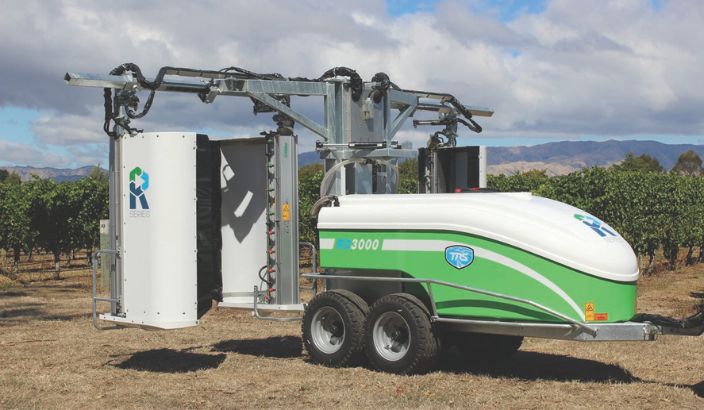Springing into spraying


The hum of tractors and buzz of frost machines are familiar sounds in Marlborough’s spring. As new leaves unfurl, growers get to work protecting the season’s crop from challenges that can affect fruit quality and vine health. Photo: Supplied.
KAT PICKFORD
The hum of tractors and buzz of frost machines are familiar sounds in Marlborough’s spring. As new leaves unfurl, growers get to work protecting the season’s crop from challenges that can affect fruit quality and vine health.
Crop protection is one of the most visible vineyard jobs – and although sprays are used on all food crops, from apples to potatoes, it often raises questions from the community. So what’s really being used, and why?
Fruitfed Supplies senior technical representative Blair McLean, who has worked in the industry for 30 years, says that compared to many other crops, grapes are relatively low-input and require fewer treatments. Agrichemicals are mainly used to prevent fungal diseases such as powdery mildew, downy mildew and botrytis – all of which can damage fruit and weaken vines.
“Growers keep a close eye on conditions and spray when needed to prevent disease that can compromise fruit quality and cause flavour defects in the finished wine,” he says.
Spray technology and vineyard management have evolved significantly. “Gone are the days of broad-spectrum insecticides. Today’s products are far more targeted, designed to control pests such as leafroller moths and mealybugs without harming beneficial insects like ladybirds and hoverflies.”
These helpful insects, which thrive in the inter-row crops common in Marlborough vineyards, also help keep pest numbers down. “Growers now take an integrated approach – combining monitoring, modelling, biological controls and canopy management, as well as sprays – to keep vines healthy while reducing chemical use overall,” Blair says. Many also use cover crops to suppress weeds, while others rely on herbicides or mechanical cultivation, depending on their vineyard system.
Vineyard machinery has also come a long way. TRS Wholesale business development and product support manager Tim Curr says Marlborough growers follow some of the highest spray standards in the world, guided by Sustainable Winegrowing New Zealand (SWNZ) – the industry’s certification programme, which sets best-practice standards and requires detailed spray records.
One local innovation leading the way is the TRS Recycle Sprayer, developed in Marlborough and now exported to the US, Australia, Europe and Canada. Its groundbreaking design captures up to 90% of spray that doesn’t land on the vine and feeds it back into the system. “Reducing spray waste provides a significant cost saving for growers – and it’s better for the environment and the community,” Tim says.
Uptake has been strong, with increasing numbers of recycle sprayers entering the market in Marlborough – a sign, he says, of how committed local growers are to reducing waste and improving efficiency.
Curious about how vineyards manage sprays safely and responsibly? Meagan Littlejohn, programme manager at Sustainable Winegrowing New Zealand, answers some common questions.
Why do vineyards spray at all?
Grapevines, like any food crop, are vulnerable to weeds, pests and disease. Without approved sprays, fruit quality would drop and some crops could be lost altogether.
How are sprays regulated?
Before any agrichemical can be used in New Zealand, it must be approved by the Ministry for Primary Industries and the Environmental Protection Authority. SWNZ adds extra checks around crop safety, residues, resistance and overall effectiveness. SWNZ-certified vineyards (which make up 98% of all vineyard area) can only use agrichemicals approved for use in the industry’s annual rule book.
Are there rules about when and how spraying can happen?
Yes – very clear ones. Growers and contractors are trained, their equipment is regularly calibrated and checked, and spraying isn’t allowed in high winds. Buffer zones protect waterways and neighbours, and vineyards are audited.
Is the industry trying to spray less?
Absolutely. The industry is constantly monitoring, measuring and innovating to reduce spray use. Spraying is costly and used only when there’s no alternative.
Concerned about unsafe spraying?
Unsafe spraying, such as spraying in high winds is taken seriously.
If you see it happening, contact Marlborough District Council by phone: 03 520 7400, or email: [email protected]
